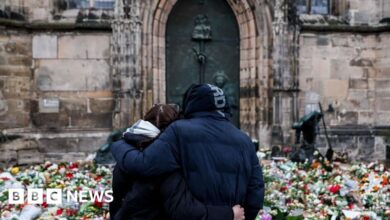President Masisi’s BDP wants to stay in power for another 5 years
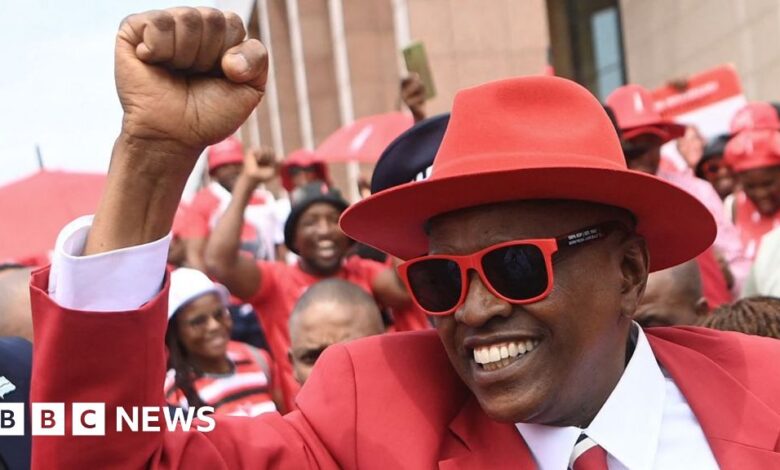
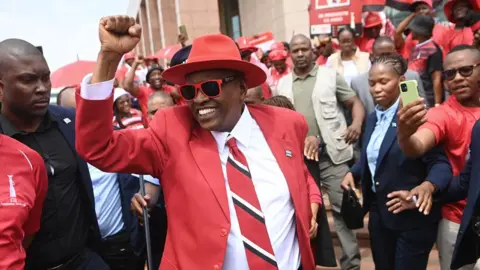 AFP
AFPBotswana’s ruling party – in power for nearly six decades – is trying to pull a trick in Wednesday’s general election by using a phrase long associated with opposition groups.
In its manifesto, the Botswana Democratic Party (BDP) is calling for “change”.
“Let’s change together and build prosperity for all,” President Mokgweetsi Masisi – who has been in charge of the country since 2018 – wrote in the introduction.
It is an admission that things need to be done differently – the opposition says the president’s party cannot afford to do that.
Although analysts say it is difficult to predict the outcome of this election, the BDP has won a large majority in parliament in 11 elections since independence in 1966.
It then always guarantees the presidency when parliamentarians elect the head of state.
The BDP is credited with overseeing a peaceful and dramatic transformation from a poor country with only a few kilometers of paved roads at independence, to one with one of the highest average living standards on the continent. .
Underpinning this transformation are Botswana’s vast diamond reserves – measured by their value, the country is the world’s largest producer of gemstones.
However all is not good.
Botswana is facing major economic challenges – hence Masisi’s talk of change.
According to the World Bank, more than a quarter of the working population is unemployed, with the rate being even higher among young people.
Professor of politics at the University of Botswana Zibani Maundeni describes this as a “jobless economy”.
“Every year we produce graduates and the economy doesn’t create enough jobs for them,” he told the BBC’s Africa Daily podcast.
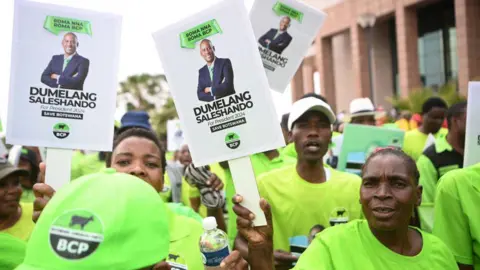 AFP
AFPAdditionally, Botswana’s wealth is not evenly distributed among its 2.3 million people.
Using a measure called the Gini index, the researchers said one of the most unequal countries in the world.
And the diamond industry appears to be under pressure globally as demand dwindles.
But Masisi and his team continue to show confidence.
At a campaign rally in the opposition stronghold of central Botswana, the president arrived in style in a locally assembled electric vehicle.
Stepping out, the 63-year-old former teacher danced toward the stage to greet supporters dressed in the party’s red and white colors.
Laughter echoed throughout the crowd as Masisi’s humor and charisma excited the audience.
The region – home to previous President Ian Khama – elected three opposition MPs in 2019.
This came after Khama defected to the BDP to help form the Botswana Patriotic Front (BPF), saying he regretted choosing Masisi as his successor.
The dramatic fallout between the two men led to Khama leaving the country, accusing the government of trying to poison him.
Khama was later charged with money laundering and other crimes, which he denies.
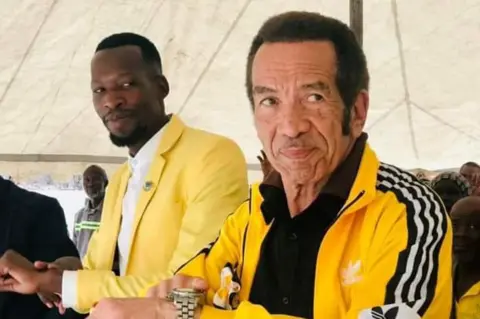 Selatlhwa is innocent
Selatlhwa is innocentIt also ended his family’s political dominance – his father, Sir Seretse Khama, was the country’s first president and served for 14 years from 1966.
“I’m sorry, please go back home and call the others,” Masisi told the rally calling on voters to return to the BDP.
The hairdresser’s owner, Thandiwe Potso, 32, seemed convinced.
“Masisi really understands our challenges and offers better programs to fund our businesses,” she told the BBC, her eyes shining with conviction.
Kabelo Selemo, 45, agrees.
“His policies have helped us grow because you can see we no longer import vegetables. I believe in his vision for our future,” the small business owner said.
But according to one poll, many others may not be so easily persuaded.
Respected nonpartisan voting organization Afrobarometer published a report on the damage earlier this year.
It is said that although the country ranks highly for good governance on the continent, people in Botswana have a negative view of the government believing there are high levels of corruption.
“A strong majority expressed little or no confidence in the incumbent and disapproved of the way he did his job,” it said.
BDP spokesperson Kagelelo Banks Kentse questioned the credibility of the poll.
He argues that the Afrobarometer in previous elections underestimated support for the BDP and thinks this time will be no different. Although the party does not take anything for granted.
“It would be very wrong to say we are overconfident,” Kentse told the BBC.
“I always hear people say, ‘This is the toughest election we’ve ever had,’ but we say that every election year. You never win before the actual vote.”
He admitted that the unemployment rate did not paint a pretty picture, but argued that every country on the continent was facing similar problems, adding that his party was pledging to create an additional 300,000 job.
Kentse also referred to the hard-negotiated deal Masisi signed with diamond company De Beers last year for Botswana to benefit more from its natural resources.
Initially, the state will receive a 30% share of domestically mined rough diamonds, up from 25% previously and rising to 50% within 10 years.
But Dumelang Saleshando, leader of one of the largest opposition parties, said the government was just copying other people’s ideas.
He said his Botswana Congress Party (BCP) had first set an employment target, which the BDP had previously rejected, saying it was better to leave things to the free market.
One of the slogans that Saleshando is implementing is: “Save Botswana”.
“I think people already know the nature of the BDP,” he told the BBC.
“It certainly cannot be argued that it is an agent of change. In the past, they always tried to say it was about stability – more than that – and because they were scared they were trying to preach what they didn’t believe in.”
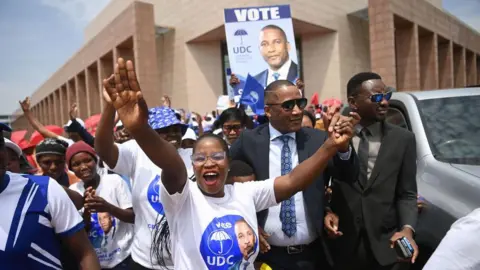 AFP
AFPSupporters of another opposition party – Umbrella for Democratic Change (UDC), the party with the second largest share of the vote in 2019, appeared in large numbers in the north of the capital Gaborone.
Wearing blue and white T-shirts and sun hats, they cheered leader Duma Boko.
Unlike Masisi, Boko remained generally serious, to emphasize how much the people had suffered under the BDP.
He alleged that there were attempts to rig the polls.
“I urge all of you to be vigilant and after voting BDP, please stay at the polling station to protect your votes,” he said.
Thapelo Dimpe, a 45-year-old former teacher, has no doubt why he wanted to see the president’s party defeated.
“Masisi has let us down on education reform. UDC plans to invest in our schools and empower our youth with the education they deserve,” he said.
Although the government faces a series of problems that could erode its support, the opposition’s split could help the BDP stay in power.
Every MP is elected on a first-come-first-served basis, meaning that to win a seat, the BDP only needs the largest number of votes in a constituency instead of more than 50%.
In a seat where the UDC, BCP or BPF – or some other party – are contesting, it could mean the opposition vote splits, allowing the BDP to enter.
Political analyst Lesole Machacha told the BBC: “These parties seem to have internal factionalism, they constantly bring internal problems to the media – they are not really united.”
But he also pointed out that the BDP also has its own problems.
“The ruling party is not 100% intact – they are also having problems. In some constituencies, BDP politicians unhappy with the primary process are running as independent candidates, which could split those votes,” Machacha said.
All of this makes for a closely competitive and unpredictable election, he added.
For one of Africa’s most successful political parties, the question now is whether enough people believe it can oversee the change the country needs.
Other BBC stories about Botswana:
 Getty Images/BBC
Getty Images/BBC



